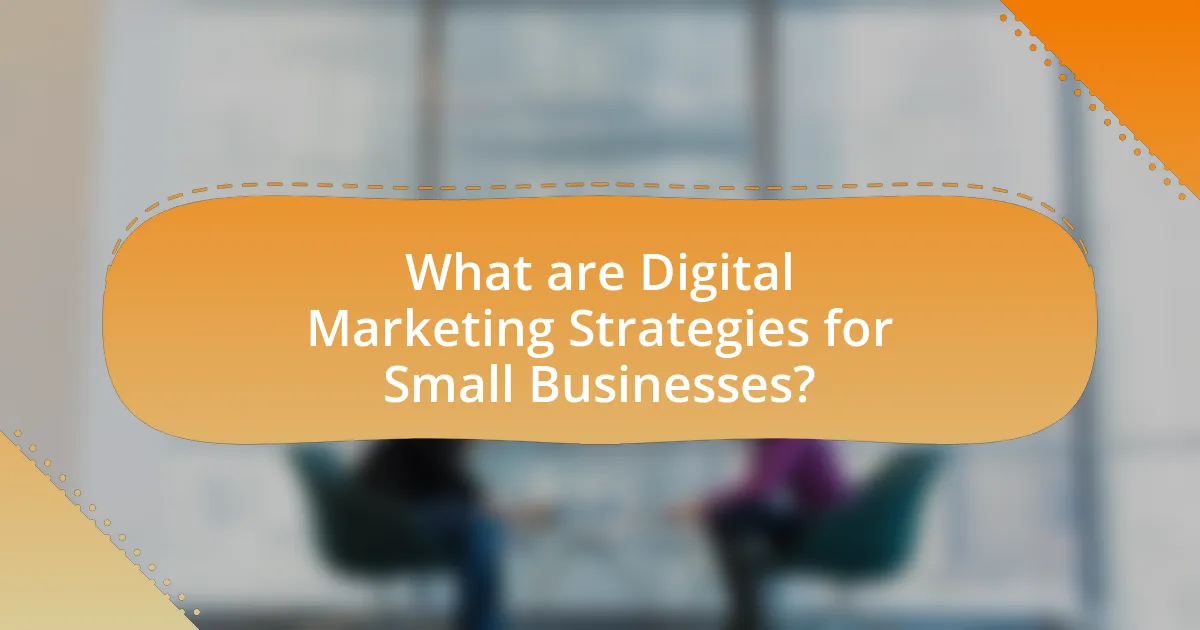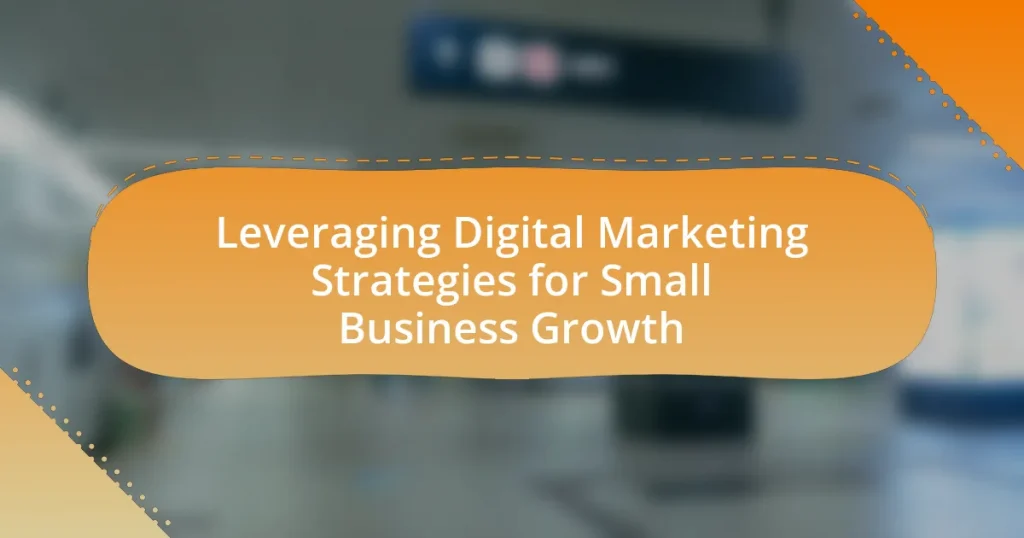Digital marketing strategies are essential for small businesses aiming to enhance their growth and visibility in a competitive market. Key strategies include search engine optimization (SEO), social media marketing, content marketing, email marketing, and pay-per-click advertising, each offering unique benefits such as increased engagement and higher conversion rates. The article explores how these digital marketing approaches differ from traditional methods, outlines their key components, and provides actionable steps for small businesses to implement effective strategies. Additionally, it highlights common challenges faced by small businesses in digital marketing and offers insights into overcoming budget constraints while maximizing return on investment.

What are Digital Marketing Strategies for Small Businesses?
Digital marketing strategies for small businesses include search engine optimization (SEO), social media marketing, content marketing, email marketing, and pay-per-click advertising. SEO enhances online visibility by optimizing website content for search engines, which can lead to increased organic traffic; for instance, businesses that invest in SEO can see a return on investment of up to 122% (HubSpot). Social media marketing allows small businesses to engage with customers on platforms like Facebook and Instagram, where 73% of marketers believe their efforts through social media have been effective for their business (Buffer). Content marketing focuses on creating valuable content to attract and retain customers, with companies that prioritize blogging generating 67% more leads than those that do not (Demand Metric). Email marketing remains a cost-effective strategy, with an average return of $42 for every dollar spent (Litmus). Lastly, pay-per-click advertising provides immediate visibility on search engines and can be tailored to specific demographics, making it a flexible option for small businesses looking to drive targeted traffic.
How do Digital Marketing Strategies differ from traditional marketing?
Digital marketing strategies differ from traditional marketing primarily in their use of digital channels and data-driven approaches. Digital marketing leverages online platforms such as social media, search engines, and email to reach audiences, allowing for real-time engagement and interaction. In contrast, traditional marketing relies on offline methods like print ads, television, and radio, which often lack immediate feedback mechanisms.
Furthermore, digital marketing enables precise targeting through analytics and user data, allowing businesses to tailor their messages to specific demographics, whereas traditional marketing typically employs broader audience targeting. According to a report by HubSpot, 70% of marketers say that converting leads is their top priority, highlighting the effectiveness of digital strategies in lead generation and conversion compared to traditional methods.
What are the key components of Digital Marketing Strategies?
The key components of digital marketing strategies include search engine optimization (SEO), content marketing, social media marketing, email marketing, pay-per-click advertising (PPC), and analytics. SEO enhances website visibility on search engines, driving organic traffic; content marketing involves creating valuable content to engage audiences; social media marketing utilizes platforms like Facebook and Instagram to connect with customers; email marketing targets specific audiences with personalized messages; PPC provides immediate traffic through paid ads; and analytics measures performance to optimize strategies. These components collectively contribute to effective digital marketing, as evidenced by a 2021 HubSpot report indicating that businesses utilizing these strategies saw a 50% increase in leads.
Why are Digital Marketing Strategies essential for small businesses?
Digital marketing strategies are essential for small businesses because they provide cost-effective methods to reach a wider audience and enhance brand visibility. Unlike traditional marketing, digital marketing allows small businesses to target specific demographics through platforms like social media, email, and search engines, which can lead to higher conversion rates. According to a report by the Small Business Administration, 70% of small businesses that actively engage in digital marketing see an increase in customer engagement and sales. This demonstrates that effective digital marketing strategies not only improve online presence but also drive measurable business growth.
What are the main types of Digital Marketing Strategies?
The main types of digital marketing strategies include search engine optimization (SEO), content marketing, social media marketing, email marketing, pay-per-click advertising (PPC), affiliate marketing, and influencer marketing. Each strategy serves distinct purposes; for instance, SEO enhances website visibility on search engines, while content marketing focuses on creating valuable content to engage audiences. According to a report by HubSpot, 61% of marketers consider improving SEO and growing their organic presence as their top inbound marketing priority, highlighting the effectiveness of these strategies in driving business growth.
How does content marketing contribute to small business growth?
Content marketing contributes to small business growth by enhancing brand visibility and establishing authority in the market. By creating valuable and relevant content, small businesses can attract and engage their target audience, leading to increased customer loyalty and higher conversion rates. According to a HubSpot report, companies that prioritize blogging are 13 times more likely to achieve a positive ROI. Additionally, content marketing can improve search engine rankings, as consistent, high-quality content boosts organic traffic. This increased visibility can result in more leads and sales, ultimately driving growth for small businesses.
What role does social media play in Digital Marketing for small businesses?
Social media plays a crucial role in digital marketing for small businesses by providing a platform for direct engagement with customers and enhancing brand visibility. Small businesses utilize social media to reach a broader audience, as platforms like Facebook, Instagram, and Twitter have billions of active users. According to a 2021 report by Hootsuite, 73% of marketers believe that their efforts through social media marketing have been “somewhat effective” or “very effective” for their business. This engagement fosters customer loyalty and allows for targeted advertising, which can lead to increased sales and brand awareness. Additionally, social media analytics provide valuable insights into customer behavior, enabling small businesses to tailor their marketing strategies effectively.

How can Small Businesses Leverage Digital Marketing Strategies?
Small businesses can leverage digital marketing strategies by utilizing social media platforms, search engine optimization (SEO), and email marketing to reach their target audience effectively. Social media allows small businesses to engage with customers directly, build brand awareness, and promote products or services at a low cost; for instance, 73% of marketers believe that their efforts through social media marketing have been “somewhat effective” or “very effective” for their business (Buffer, 2021). SEO enhances online visibility, driving organic traffic to websites, which is crucial since 93% of online experiences begin with a search engine (Search Engine Journal, 2021). Email marketing enables personalized communication, with an average return on investment of $42 for every dollar spent (Litmus, 2021). By integrating these strategies, small businesses can increase their market presence and drive growth.
What steps should small businesses take to implement Digital Marketing Strategies?
Small businesses should take the following steps to implement digital marketing strategies: first, define clear marketing goals that align with overall business objectives. Next, identify the target audience by researching demographics, preferences, and online behavior. Then, choose appropriate digital marketing channels such as social media, email marketing, and search engine optimization based on where the target audience is most active.
After selecting channels, create a content strategy that includes engaging and relevant content tailored to the audience’s interests. Following this, establish a budget for digital marketing efforts, allocating resources effectively across chosen channels. Implement tracking tools like Google Analytics to measure performance and gather insights. Finally, continuously analyze results and adjust strategies based on data to optimize effectiveness.
These steps are supported by the fact that businesses with a clear digital marketing strategy can see a 126% higher lead growth than those without one, according to HubSpot’s State of Inbound report.
How can small businesses identify their target audience online?
Small businesses can identify their target audience online by utilizing data analytics tools and social media insights. These tools allow businesses to analyze customer demographics, behaviors, and preferences based on their online interactions. For instance, platforms like Google Analytics provide detailed reports on website visitors, including age, gender, location, and interests, which helps businesses tailor their marketing strategies effectively. Additionally, social media platforms such as Facebook and Instagram offer audience insights that reveal engagement patterns and follower demographics, enabling businesses to refine their target audience further. This data-driven approach is essential, as studies show that targeted marketing can increase conversion rates by up to 50%, demonstrating the importance of accurately identifying and understanding the target audience.
What tools can assist small businesses in executing Digital Marketing Strategies?
Small businesses can utilize various tools to effectively execute digital marketing strategies, including social media management platforms, email marketing software, and analytics tools. Social media management platforms like Hootsuite and Buffer enable businesses to schedule posts, engage with audiences, and analyze performance across multiple channels. Email marketing software such as Mailchimp and Constant Contact allows for targeted campaigns, automation, and tracking of engagement metrics. Analytics tools like Google Analytics provide insights into website traffic, user behavior, and conversion rates, helping businesses refine their strategies based on data-driven decisions. These tools collectively enhance the ability of small businesses to reach and engage their target audience effectively.
What challenges do small businesses face in Digital Marketing?
Small businesses face several challenges in digital marketing, including limited budgets, lack of expertise, and intense competition. Limited budgets restrict their ability to invest in comprehensive marketing strategies, which can hinder their visibility and reach. Additionally, many small business owners lack the technical skills or knowledge required to effectively utilize digital marketing tools and platforms, leading to inefficient campaigns. Intense competition from larger companies with more resources further complicates their efforts, making it difficult for small businesses to stand out in crowded markets. According to a survey by the Small Business Administration, 70% of small businesses report that they struggle with marketing due to these constraints.
How can small businesses overcome budget constraints in Digital Marketing?
Small businesses can overcome budget constraints in digital marketing by prioritizing cost-effective strategies such as social media marketing, content marketing, and search engine optimization (SEO). These methods allow businesses to reach their target audience without significant financial investment. For instance, social media platforms like Facebook and Instagram offer free account setups and low-cost advertising options, enabling small businesses to engage with customers directly. Additionally, content marketing, which includes blogging and creating informative videos, can enhance brand visibility and attract organic traffic, reducing reliance on paid advertising. SEO further supports this by optimizing website content to rank higher in search engine results, driving more traffic without ongoing costs. According to a HubSpot report, companies that prioritize blogging are 13 times more likely to see a positive ROI, demonstrating the effectiveness of these budget-friendly strategies.
What are common mistakes small businesses make in Digital Marketing?
Common mistakes small businesses make in digital marketing include neglecting to define their target audience, failing to utilize data analytics, and not maintaining a consistent brand presence across platforms. Small businesses often overlook the importance of understanding who their customers are, which leads to ineffective marketing strategies. According to a survey by HubSpot, 61% of marketers say generating traffic and leads is their top challenge, indicating a lack of targeted outreach. Additionally, many small businesses do not leverage data analytics to measure the effectiveness of their campaigns, resulting in missed opportunities for optimization. A report from Google shows that businesses that use data-driven marketing strategies see a 5-8 times higher ROI. Lastly, inconsistency in branding can confuse potential customers; research by Lucidpress indicates that consistent branding can increase revenue by up to 23%.

What are the Benefits of Digital Marketing for Small Business Growth?
Digital marketing significantly enhances small business growth by increasing visibility, improving customer engagement, and providing cost-effective advertising solutions. Small businesses can reach a broader audience through online platforms, with 79% of consumers stating they prefer to shop online, according to a 2021 survey by Statista. This increased visibility leads to higher traffic and potential sales. Additionally, digital marketing allows for targeted advertising, enabling small businesses to reach specific demographics, which can result in a higher conversion rate. A report by HubSpot indicates that businesses that prioritize blogging are 13 times more likely to achieve a positive ROI. Furthermore, digital marketing offers measurable results, allowing small businesses to analyze performance and adjust strategies in real-time, ensuring efficient use of resources.
How does Digital Marketing enhance customer engagement?
Digital marketing enhances customer engagement by utilizing targeted communication strategies that foster interaction and build relationships. Through channels such as social media, email, and personalized content, businesses can reach customers with relevant messages that resonate with their interests and behaviors. For instance, a study by HubSpot found that companies using personalized email marketing saw a 29% increase in open rates and a 41% increase in click-through rates, demonstrating the effectiveness of tailored communication in engaging customers. Additionally, digital marketing allows for real-time feedback and interaction, enabling businesses to respond promptly to customer inquiries and preferences, further strengthening engagement.
What metrics should small businesses track to measure success in Digital Marketing?
Small businesses should track metrics such as website traffic, conversion rates, customer acquisition cost, return on investment (ROI), and social media engagement to measure success in digital marketing. Website traffic indicates the number of visitors, which helps assess the effectiveness of marketing campaigns. Conversion rates show the percentage of visitors who take desired actions, providing insight into campaign performance. Customer acquisition cost reveals the expense incurred to gain a new customer, allowing businesses to evaluate the efficiency of their marketing spend. ROI measures the profitability of marketing efforts, while social media engagement reflects audience interaction, indicating brand awareness and customer loyalty. These metrics collectively provide a comprehensive view of digital marketing effectiveness, enabling small businesses to make data-driven decisions.
How can Digital Marketing improve brand visibility for small businesses?
Digital marketing can significantly improve brand visibility for small businesses by utilizing online platforms to reach a broader audience. Through strategies such as search engine optimization (SEO), social media marketing, and content marketing, small businesses can enhance their online presence. For instance, a study by HubSpot found that 61% of marketers consider improving SEO and growing their organic presence as their top inbound marketing priority, which directly correlates with increased brand visibility. Additionally, social media platforms like Facebook and Instagram allow small businesses to engage with potential customers, fostering brand recognition and loyalty. By leveraging these digital marketing strategies, small businesses can effectively increase their visibility in a competitive market.
What are some successful case studies of small businesses using Digital Marketing?
Successful case studies of small businesses using digital marketing include the following:
-
Dollar Shave Club: This subscription-based razor company utilized viral video marketing to gain traction. Their humorous and engaging video led to 12,000 new subscribers within 48 hours, showcasing the power of social media and content marketing.
-
BrewDog: This craft beer company effectively used social media campaigns and crowdfunding to grow its brand. By engaging with customers on platforms like Twitter and Facebook, BrewDog raised over £26 million through its Equity for Punks crowdfunding initiative, demonstrating the effectiveness of community-driven marketing.
-
Warby Parker: This eyewear retailer leveraged digital marketing through a home try-on program and strong social media presence. Their innovative approach resulted in rapid growth, with sales reaching $250 million in 2015, highlighting the impact of user experience and online engagement.
-
Glossier: This beauty brand built its success on social media marketing and community engagement. By encouraging user-generated content and feedback, Glossier achieved a valuation of $1.2 billion in just five years, illustrating the effectiveness of leveraging customer relationships in digital marketing.
These case studies exemplify how small businesses can effectively utilize digital marketing strategies to achieve significant growth and brand recognition.
What strategies did these businesses implement for growth?
Businesses implemented targeted digital marketing strategies for growth, focusing on social media advertising, search engine optimization (SEO), and content marketing. For instance, social media advertising allowed businesses to reach specific demographics effectively, resulting in increased brand awareness and customer engagement. SEO enhanced their online visibility, driving organic traffic to their websites, which is crucial for attracting potential customers. Additionally, content marketing, through blogs and informative articles, established authority in their respective industries, fostering trust and encouraging customer loyalty. These strategies collectively contributed to measurable growth in customer acquisition and retention.
What lessons can other small businesses learn from these case studies?
Small businesses can learn the importance of targeted digital marketing strategies from these case studies. By analyzing successful examples, businesses can identify effective tactics such as social media engagement, search engine optimization, and email marketing that drive customer acquisition and retention. For instance, a case study may reveal that a small business increased its online sales by 40% through a well-executed social media campaign, demonstrating the potential return on investment from digital marketing efforts. Additionally, these case studies often highlight the significance of data analytics in refining marketing strategies, allowing businesses to adapt to consumer behavior and preferences effectively.
What are the best practices for Small Businesses in Digital Marketing?
The best practices for small businesses in digital marketing include establishing a strong online presence, utilizing social media effectively, optimizing for search engines, and leveraging email marketing. A strong online presence is crucial as 81% of consumers conduct online research before making a purchase, highlighting the need for an informative and user-friendly website. Effective use of social media platforms allows small businesses to engage with their audience, with 73% of marketers believing that their efforts through social media marketing have been “somewhat effective” or “very effective” for their business. Search engine optimization (SEO) is essential, as 68% of online experiences begin with a search engine, making it vital for small businesses to rank well in search results. Lastly, email marketing remains one of the most cost-effective strategies, with an average return on investment of $42 for every dollar spent, demonstrating its effectiveness in reaching and retaining customers.
How can small businesses create effective content for their audience?
Small businesses can create effective content for their audience by understanding their target demographic and tailoring content to meet their specific needs and preferences. This involves conducting market research to identify audience interests, pain points, and preferred content formats, such as blogs, videos, or social media posts. According to a HubSpot report, 70% of marketers actively invest in content marketing, highlighting its importance in engaging audiences. By consistently delivering valuable, relevant, and high-quality content, small businesses can build trust and foster customer loyalty, ultimately driving growth.
What are the key elements of a successful social media strategy for small businesses?
A successful social media strategy for small businesses includes clear goals, audience understanding, content planning, engagement tactics, and performance measurement. Clear goals help define what the business aims to achieve, such as brand awareness or lead generation. Understanding the target audience allows businesses to tailor content that resonates with their specific demographics and interests. Content planning ensures a consistent posting schedule and diverse content types, such as images, videos, and articles, which can increase engagement. Engagement tactics, including responding to comments and participating in conversations, foster community and loyalty. Finally, performance measurement through analytics tools enables businesses to assess the effectiveness of their strategy and make data-driven adjustments. According to a 2021 survey by Hootsuite, 73% of marketers believe that social media marketing has been effective for their business, highlighting the importance of these elements in achieving success.



